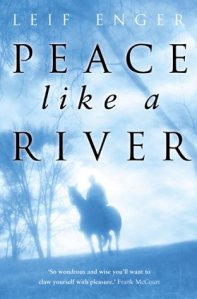 It seems my reading has really slowed down after wrapping up my dissertation a week and a half ago. I suppose I am having a bit of a lull after doing so much reading and writing over the past year and a half. Anyways, I picked up Leif Enger’s Peace Like a River on the recommendation of a friend. He suggested it was a mix of magic realism and the western genre, and he wasn’t inaccurate. Peace Like a River centres on the fateful actions of Davy Land who kills two boys in self-defense but then escapes jail and disappears into the American prairies. The novel is narrated by his younger brother, Reuben, a quirky asthmatic who longs for the ability to breath easily and fully. After Davy’s disappearance, his father Jeremiah decides to take their Plymouth car and Airstream trailer out of small-town Minnesota and head west, ostensibly on vacation but actually hoping to find Davy. Reuben’s sister Swede, who aspires to be a writer and loves Zane Grey Westerns, accompanies them and becomes a pseudo-chronicler of the trip as she writes an epic long poem about a vigliant cowboy (Sunny Sundown) trying to hunt down a dastardly villain. The poem provides an interesting counterpoint to the novel’s action as Sundown’s morals and character change according to the increasingly complex moral world that Reuben and Swede find themselves in.
It seems my reading has really slowed down after wrapping up my dissertation a week and a half ago. I suppose I am having a bit of a lull after doing so much reading and writing over the past year and a half. Anyways, I picked up Leif Enger’s Peace Like a River on the recommendation of a friend. He suggested it was a mix of magic realism and the western genre, and he wasn’t inaccurate. Peace Like a River centres on the fateful actions of Davy Land who kills two boys in self-defense but then escapes jail and disappears into the American prairies. The novel is narrated by his younger brother, Reuben, a quirky asthmatic who longs for the ability to breath easily and fully. After Davy’s disappearance, his father Jeremiah decides to take their Plymouth car and Airstream trailer out of small-town Minnesota and head west, ostensibly on vacation but actually hoping to find Davy. Reuben’s sister Swede, who aspires to be a writer and loves Zane Grey Westerns, accompanies them and becomes a pseudo-chronicler of the trip as she writes an epic long poem about a vigliant cowboy (Sunny Sundown) trying to hunt down a dastardly villain. The poem provides an interesting counterpoint to the novel’s action as Sundown’s morals and character change according to the increasingly complex moral world that Reuben and Swede find themselves in.
I hesitate to call Peace Like a River a satire of Westerns because it is clear that Enger also has an affectionate attachment to that genre. I cannot claim an intimate familiarity with it, but it’s not hard to pick up the traces of the genre within the novel’s movement. Of course, Peace Like a River is an update Western with the horses replaced (for the most part) by a Plymouth family wagon and the Wild West replaced by the economically-depressed American midwest. Davy is both the villain (he escaped from prison before his trial and is hunted for by federal agents) and the loner hero who is misunderstood by others. There are chases, close calls, guns, and even Swede riding on an authentic Mexican saddle (on a sawhorse in the trailer … there’s also a fair bit of humour too). I suspect that a love for westerns will make this book great in those readers’ minds, but it is not essential as I found it engaging and enthralling.
The other part of the novel that I need to mention is the use of miracles. Peace Like a River is an explicitly Christian novel in that Reuben and his family are Christians, but, more importantly, the novel is a spiritual journey on Reuben’s part. He struggles to understand his father who was on the path to becoming a doctor, but decided on the calling of the Holy Spirit to abandon this pursuit. At the novel’s start he is a lowly school janitor, but boasts an impressive prayer life such that Reuben is witness to various miracles including healing various ailments and walking on air. These events are where the novel borders on magic realism, but I hesitate to call them that because in the imaginative realm of the novel they are simply events (miraculous though they may be). Magic realism has a very specific lineage and genealogy that I’m not sure Peace Like a River fits into (see this site for a discussion of its meanings). If miracles aren’t your thing, then this novel may not be for you … or it may change your mind. Anyways, miracles are a key theme in the novel and I found Enger’s use of them intriguing and sophisticated.
Overall, I loved this novel and am planning on teaching it this fall in a first-year literature and composition class. I would highly recommend this book to all readers.
Enger, Leif. Peace Like a River. New York: Grove/Atlantic, 2001. Print.